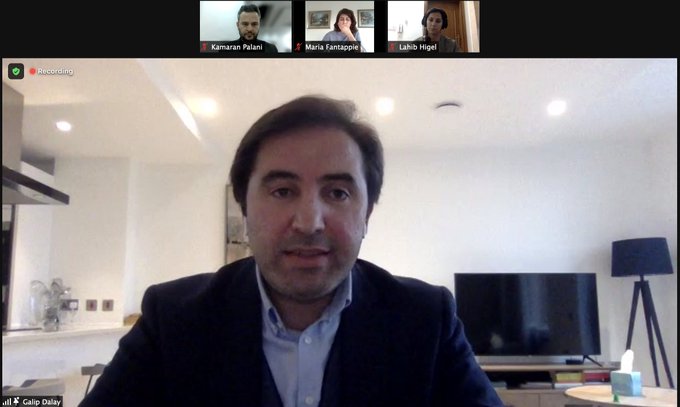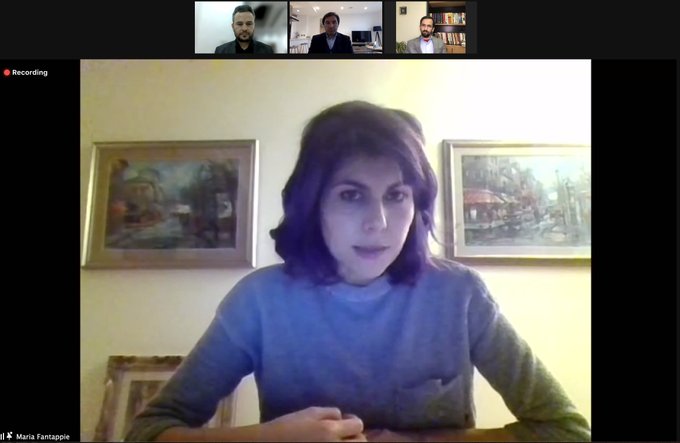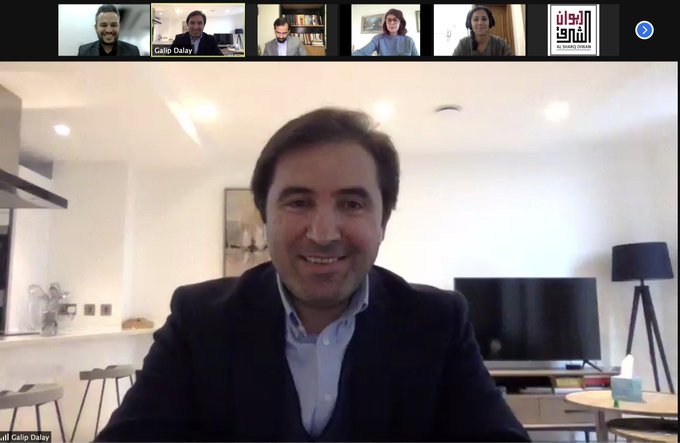Friday, November 19, 2021. Prior restraint -- a trademark of the Biden era?, Joe continues to misuse the FBI to protect his daughter, Mosul remains scarred, the media works hard to let the officials in the KRG off scott free and much more.
Starting in the US, the Reporters Committee for Freedom of the Press issued the following statement:
Today, a state court in New York entered a prior restraint at the request of Project Veritas against the New York Times ordering it to “refrain from further disseminating or publishing any of Project Veritas’ ‘privileged materials'” in its possession, pending a court hearing next week. The order also bars the Times from “further efforts to solicit or acquire” Project Veritas’ “attorney-client privileged materials.”
The following may be attributed to Bruce Brown, executive director of the Reporters Committee for Freedom of the Press:
“This is the first prior restraint entered against the New York Times since the Pentagon Papers, and it is an outrageous affront to the First Amendment.
“Prior restraints — which are orders not to publish — are among the most serious threats to press freedom. The trial court should have never entered this order. If it doesn’t immediately vacate the prior restraint, an appellate court must step in and do so.”
The Reporters Committee regularly files friend-of-the-court briefs and its attorneys represent journalists and news organizations pro bono in court cases that involve First Amendment freedoms, the newsgathering rights of journalists and access to public information. Stay up-to-date on our work by signing up for our monthly newsletter and following us on Twitter or Instagram.
That is a huge overstep. Prior restraint.
It's getting a lot of attention. IN fact, it's getting more attention than a related -- and much more important -- matter. Joe Biden's misuse of the FBI.
Joe's abusing the power of the office and that is a high crime. Who is he protecting by the way?
His drug using daughter who apparently kept a sex diary and then, high and stoned, lost it.
Joe's using the FBI and the Justice Dept on this matter.
That's an abuse of power. It's a misuse of the government. Should, heaven forbid, the US suffer another 9/11 tomorrow, he would need to answer to the American people why he used government resources illegally to protect his daughter and how that harmed the safety of the nation since these misused resources should have been focused on issues pertaining to the safety of the American people.
That's not what the president does. It's an abuse of power.
Your forty-year-old daughter's an adventurer (or slut, whatever you prefer) who documents her drugs use and extra-marital sex? That's your personal problem. Stop abusing government resources and misusing the taxypayers' money to try to protect your daughter. Maybe buy her some condoms out of your own money (or whatever you've forced Hunter to grift for you) but stop misusing the US Justice Dept.
Your daughter's slutting around is not a national security matter. It's an embarrassment but, sadly, your whole family's become that. Your misuse of the power of the office is an abuse and does qualify as a high crime. You should apologize immediately. If the House flips, as history suggests it will and as polling predicts it will, in the mid-terms, your actions are begging the GOP to bring impeachment charges against you.
The move is as dumb as AOC. And apparently that's what we're currently stuck with: Idiotic statements and moves from what passes for the Democratic Party. From MEDIAITE:
Ocasio-Cortez is a frequent target of outrage and derision by her GOP colleagues, but she gave as good as she’s gotten in this clip. She “complimented” the House Minority Leader for managing “to speak for over an hour with one of the lowest vocabularies I have ever seen, coming from a member of House Leadership.”
She did not give good. She embarrassed herself yet again. Seh's still the same corporatist airhead that I said she was before she was sworn in. Seh's a fake ass and one of The Fraud Squad which most people now get. But she's also an idiot. Read the above and grasp that she crafted it with the help of three people and she still comes off as an idiot. Referring to what someone said, what was spoken, she states it was "one of the lowest vocabularies I have ever seen."
She can't even do bitchy right, she's that stupid. You don't see someone use a low vocabulary, you hear them use it. What a stupid moron. Instead of all the time she spends on her makeup -- far too much for someone in Congress -- she should try to work on her comprehension skills and on her word usage. In fact, someone should gift her with a thesaurus.
And, no, Alexandria, that's not a sex toy.
Turning to Iraq, THE DAILY SABAH reports:
Turkish contractors and consultancy firms can be a part of projects involving infrastructure, hospitals, schools and public buildings in Iraq. This cooperation can be further facilitated by a reversal in discrimination regarding the conditions of fair competition as well as the easing of processes required to do business, a Turkish trade official said Friday.
Oh. Now it makes sense. The government of Turkey is terrorizing Iraqis in northern Iraq and dropping bombs and starting fires to create jobs? Oh, that makes it alright then. Let's stop calling them terrorists
No. They're terrorists and it's past time that they were treated as such.
And people have fled from that region due to the violence.
Instead of defending the people, the KRG is blaming others.
That's beyond nonsense and it's shameful. Various politicians are inventing lies to cover up for their failure to protect the citizens of the KRG from Turkey.
Liar Aydin Maruf is only one KRG official lying to the press.
He insists that people are fleeing because of the PKK.
Huh?
How is that?
The PKK is not new to the KRG. The PKK is a pro-Kurdish body -- extremely pro-Kurdish -- that took up arms in the 80s in what they saw a response to the never ending attacks -- physical attacks -- on Kurds in Turkey and elsewhere. There have been many deahts since -- innocents as well as those two main groups engaged in the struggle PKK members and members of the Turkish military.
The PKK isn't burning down forests in the region, that's the Turkish military. They claim that they have to burn things down -- it's that old 'to save the village, we had to burn the village' crap -- insisting that without burning things down, the PKK will be able to hide.
The region has various small villages and farmers. They are the ones being harmed by the actions of the Turkish military. A military, please note, that's not even supposed to legally be in Iraq.
Two days ago, AFN NEWS explained:
Soran Omer, who was elected MP in the Iraqi elections in October, released information on the Kurdistan Regional Government's attitude towards the Kurdish migrants who have been stranded at the Polish-Belarusian border.
In a post on his Facebook page, the Kurdish parliamentarian revealed that the regional government sent letters to the European countries on the matter.
According to Soran, the regional government designated the Kurdish migrants at the Polish-Belarusian border as terrorists and criminals and accused some of them of being human traffickers who abducted women and children.
COMMUNIST PARTY: INJUSTICE IS THE CAUSE OF MIGRATION
In the meantime, the Kurdistan Communist Party held a demonstration in Hewlêr (Erbil) to express their concerns over the migration from the region.
A statement was read out by Raber Mexdîd, head of the youth wing of the party’s Hewler branch.
“The lives of migrants at the Polish-Belarusian border are in huge jeopardy because of the cold weather and hunger. We call on the United Nations and other international organizations to fulfil their responsibilities and address the precarious conditions of the migrants,” the statement said.
The statement added that the erosion of freedoms and lack of justice, basic services and job opportunities are the reasons for migration.
Let's stay with reality. Mosul has not been rebuilt all this time later. That shouldn't be a controversial observation. Yet whenever we make it there are people (Americans) who just know that they know better. One e-mailer insists, "Everything's fine, people are fine, it's all rebuilt and everyone has gotten on with their lives. There are no scars and no healing necessary. You spend too much time watching MSNBC."
MSNBC doesn't cover Iraq. Why would I watch that channel? RT covers Iraq. Regularly. At any rate, the scars remain and the healing is not complted. Let's note Doctors Without Borders:
“I still remember the exact moment I understood what it means to be neutral and impartial,” says Abdulrahman Dhannoon Khaleel, MSF Project Coordinator Support in West Mosul, Iraq. “This was 2017; I had only been with MSF for a short time then. We were working in a makeshift hospital in the Nablus neighbourhood, in West Mosul, close to the front line. And injured people were arriving at our hospital every hour.”
Between the fronts
Between 2016 and 2017, the Iraqi Security Forces, supported by a US-led international coalition, launched a military offensive to retake Mosul from the Islamic State group, who had been occupying the city for three and a half years.
“The situation was chaotic,” Dhannoon recalls. “One day, we received a wounded child in the MSF makeshift hospital. The six-year-old was being interrogated on the suspicion that his father was a member of the Islamic State group. We put ourselves in front of the boy and protected him. The only thing that mattered to us was that he needed medical help.”
“In the end, it turned out that he and his parents were civilians,” continues Dhannoon. “They tried to flee the city but did not manage to escape the fighting. They were swept away by the battle and got stuck in the old city - a maze of small streets and historic houses, until the neighbourhood was liberated. In the chaos, the young boy was separated from his parents.”
Now, more than four years later, the devastating effects of the war are not only still visible, but also still strongly felt in Ninewa governorate, northwest Iraq, and in its main city, Mosul. Many people are still displaced; people’s psychological trauma remains largely untreated, and many of the damaged health facilities are not yet fully functional again.
Hope for the future
“I was here when the Islamic State group took the city in 2014 up
until the end of the war. It is impossible to explain what that was
like,” Dhannoon remembers. “There are simply no words for it... It was
like being tortured from the inside. There was no future... nothing.”
“The things we have experienced put a heavy burden on us. Nobody talks
about that though,” says Dhannoon. “Yes, the war is over, yes, the city
is safer, but you can still see a lot of anger and pain in people’s eyes
wherever you go.”
Yes, the war is over, yes, the city is safer, but you can still see a lot of anger and pain in people’s eyes wherever you go.Abdulrahman Dhannoon Khaleel, MSF Project Coordinator Support in West Mosul, Iraq
“People here want to look forward,” Dhannoon continues. “Many would say that they are happy, but in reality, we have seen a lot of misery, really a lot of misery.”
Just like its people, Mosul is fighting to get back on its feet. The
traces of the war still shape the cityscape, but reconstruction efforts
are progressing.
MSF teams are trying to heal both the physical and psychological scars
of the war by providing access to much needed healthcare for the heavily
affected people of Mosul. We run a hospital offering free neonatal,
maternity, and paediatric services in the Nablus neighbourhood, on the
west bank of the Tigris River.
Further east, in Al-Nahrawan, one of the poorest neighbourhoods of Mosul, another similar project is run by our teams. At both locations, an average of up to 1,000 children are born and cared for each month. In eastern Mosul, MSF also offers reconstructive surgery and comprehensive post-operative care at the Al-Wahda Hospital. There, our teams provide much-needed care for people injured by accidental or violent trauma.
From January to October 2021, we provided 1,029 surgical interventions, 4,494 and 1,351 inpatient and outpatient consultations respectively. Psychological support and health counselling services are also available at all three locations.
A recovering health system
“People tend to think that when a battle is over, things naturally go
back to normal,” explains Esther van der Woerdt, Head of Mission for
MSF in Iraq. “But the truth is that recovery takes years – not to say
decades.”
“Many of the basic infrastructure were destroyed or damaged during the
battles and many of them still need to be rebuilt or rehabilitated,”
says van der Woerdt. “Public healthcare structures in Mosul are
struggling to cover the needs, and some people still cannot afford
healthcare, either because they have lost everything in the conflict
and/or are hardly making ends meet after they lost their livelihood. In
that sense, the free healthcare services that we offer are quite
essential for the people.”
“People tend to think that when a battle is over, things naturally go back to normal. But the truth is that recovery takes years – not to say decades.”Esther van der Woerdt, Head of Mission for MSF in Iraq
Besides providing healthcare services, we are also helping the city’s health system to get back on its feet and are providing the required support to ensure it can cope with new emergencies. In 2019, MSF rebuilt a hospital dedicated to the treatment of infectious diseases in the east of Mosul, to improve access to health services for the local community.
And between March and December 2020, we supported Mosul’s health system in dealing with the COVID-19 pandemic, by temporarily transforming our 62-bed post-operative care centre (known today as Al-Wahda Orthopaedic Hospital), in the east of the city, into a COVID-19 isolation and treatment centre for suspected and confirmed COVID-19 cases.
From the time MSF transformed the hospital into a COVID-19 facility until returning to our regular activities, our teams cared for 975 COVID-19 patients. To further extend the support to the COVID-19 response in the Ninewa governorate, MSF also ran a 16-bed intensive care unit between November 2020 and April 2021 to offer advanced care for severely and critically ill COVID-19 patients, where 14 patients were cared for.
“Our activities in the city are evolving with the context,” says van der Woerdt. “And we’re trying to adapt to the best of our ability to people’s medical needs, guided solely by our medical ethics and neutral and impartial principles.”
No matter who you are – we are here for you
The following sites updated:




